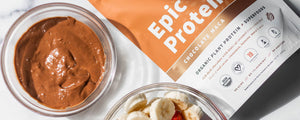
Why Is Protein Important? A Breakdown of Why Protein Matters for Health and Fitness
In today’s world of ever-evolving health and fitness trends, figuring out what “living a healthy lifestyle” actually means can feel like an uphill battle. Should you take up Pilates? Go on a juice cleanse? And wait - is goat yoga still a thing? Or is it puppy yoga now? With so many options, it’s easy to feel overwhelmed. But no matter how trends change, some of the basics never go out of style: prioritize quality sleep, stay hydrated, exercise daily, and another thing you’ll hear over and over: make sure you’re getting enough protein. But what exactly is protein, and why is it such a big deal when it comes to staying healthy? Let’s break it down.
What is protein?
Protein is often referred to as the "building block of life" for good reason. Our bodies need three main macronutrients to function: carbohydrates, fat, and of course proteins.
Each protein molecule is made up of amino acids. These amino acids define the type of protein it is:
-
Complete proteins: These proteins contain all of the nine essential amino acids your body needs to thrive. For example: quinoa, edamame, hemp seeds, and soy are all complete proteins.
-
Incomplete proteins: These proteins are missing one or more of the essential amino acids that you need to get from food. But, there’s good news: by combining different sources—like beans with rice or pita and hummus—you can make a complete protein.
What does protein do?
Complete proteins, incomplete proteins, amino acids– we know that it can all sound like a jumble of fitness jargon. So, what exactly does protein do, and why exactly is it so important? Whether you’re lounging in bed or tackling a marathon—and everything in between—your body is constantly working with protein. From repairing tissues and supporting immune function to fueling muscle growth and providing energy, protein plays a starring role in keeping you healthy and active.
-
Maintaining health: Proteins are the ultimate building block for your body. They help repair your skin and hair, fix broken nails, and can even rebuild injured internal organs. So whether you’re recovering from an injury or just maintaining overall health, protein is necessary to keep your body in top form.
-
Providing energy: When your body needs extra fuel, protein is your secret weapon. Especially during an intense workout or when your carbohydrate reserves are low.
-
Building and repairing muscles: One of the most important roles protein plays is helping you build and repair muscles. When you exercise, your muscles actually experience tiny tears. Protein’s job is to help rebuild these fibers, making your muscles stronger and more resilient over time, which makes you stronger!
-
Boosting immune health: The antibodies that help identify and attack harmful bacteria and viruses are actually proteins. They help your body fend off illness and prevent infections, and in case you do get sick, they’ll help you recover quickly.
-
Improving gut health: This one may be more shocking: certain proteins can help to maintain a healthy gut. How? By supporting the production of enzymes and hormones that regulate digestion. Protein is also in charge of fueling the cells that line your digestive tract, which helps create a balanced gut microbiome. A healthy gut not only improves digestion, but your overall metabolism, immune health, and even mental health.
-
Boosting metabolism: Protein has a high thermic effect, which means that your body burns more calories digesting it than it does fats or carbs. Protein also helps the body preserve lean muscle mass. These tissues burn more calories than fat tissues and increase your basal metabolic rate. Including enough protein in your diet is absolutely crucial regardless of your fitness goals, whether you’re focusing on muscle gains, weight loss, or long-term maintenance.
If you’re not getting enough protein, the effects can be dramatic: brittle hair and nails, muscle weakness, mood changes, trouble thinking, edema, and even stress fractures.
How much protein do I need?
Getting 8 hours of sleep a day, drinking 8 glasses of water, and exercising for at least 30 minutes–it’s easier to hit your goals when you know what they are. But when it comes to protein intake, things can sometimes feel a bit tricky because there isn’t a one-size-fits-all formula. The good news? Figuring out your daily protein needs is simpler than you might think! It just takes a little bit of math. According to the World Health Organization, adults should aim for 0.36 grams of protein per pound of body weight. That means you can calculate your daily protein goal like this:
Your body weight (in pounds) × 0.36 = grams of protein per day
Of course, everyone is different. If you’re super active, working towards specific wellness goals, or have other health factors at play, your protein needs might be higher. The best move? Talk to a doctor or a registered dietitian. They can help you figure out what’s best for you and your health.
How to eat more protein:
Including more protein in your diet is easy, too. Nowadays, even if you’re crunched for time, following a plant-based diet, or just not sure where to begin, you can make sure you’re still reaching your protein goals.
-
Include protein in every meal: Even if it’s been a long day and you just have to order Chinese take-out, make sure to include a side of tofu or edamame to boost your protein intake.
-
Plan ahead of time: A little bit of effort goes a long way– meal prepping is one of the best ways to make sure you’re getting enough protein and meeting your health goals. And even if you’re not able to commit to cooking all your food ahead of time, planning out your meals can help you stay on track.
-
Taking protein supplements: Sometimes, the easiest and tastiest way to get extra protein into your diet is with protein powder. Choose a clean, additive-free option that contains all nine essential amino acids—like our Epic Protein blends! You can make delicious protein-filled smoothies for breakfast, energy balls for a quick snack, even desserts for when those cravings kick in!
Protein is essential for your body to thrive. Thankfully, finding ways to get enough protein is easier than ever. So whether you’re waking up for an early morning sweat sesh, putting in extra hours at work, or staying curled up on your couch, let protein power you through your day.
Sources:
https://iris.who.int/bitstream/handle/10665/43411/WHO_TRS_935_eng.pdf
https://nutritionsource.hsph.harvard.edu/what-should-you-eat/protein/
https://nutritionsource.hsph.harvard.edu/what-should-you-eat/protein/#protein-research
https://pmc.ncbi.nlm.nih.gov/articles/PMC8840478/
https://pubmed.ncbi.nlm.nih.gov/18469286/
https://www.health.harvard.edu/nutrition/are-you-eating-enough-protein






